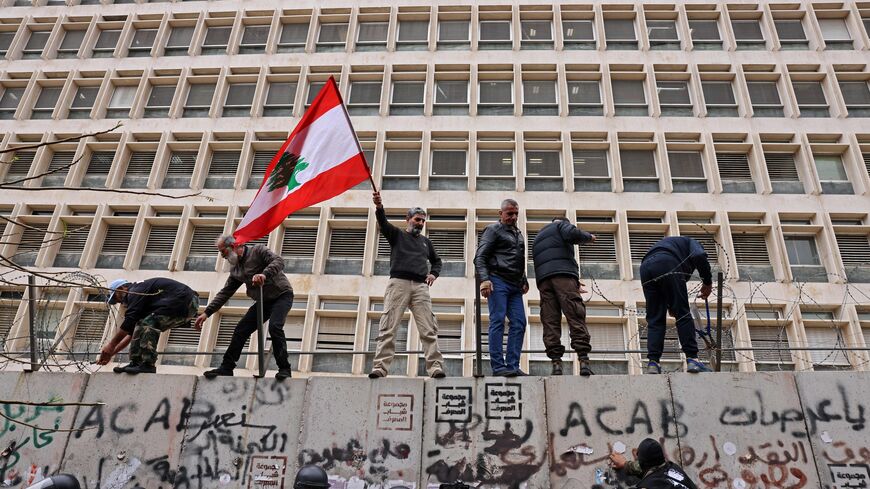BEIRUT — The recent summoning by state authorities of the editors-in-chief of two independent Lebanese news media outlets has sparked an outcry from civil society, bringing the issue of press freedom to the forefront once again.
Lebanese independent news media outlet Megaphone News' editor-in-chief, Jean Kassir, was summoned by Lebanon's State Security on March 30.
Megaphone News claims that Ghassan Oueidat, prosecutor general in the Court of Cassation, is responsible for the summons of Kassir due to a Facebook and Instagram post titled "Lebanon ruled by fugitives from justice," which includes Oueidat's name.
More bad news for press freedom in Lebanon. Two outstanding journalists, @JeanKassir from @megaphone_news and Lara Bitar from @ThePublicSource , summoned for questioning by State Security. https://t.co/igi1IqBfwn
— Kim Ghattas (@KimGhattas) April 1, 2023
The editor-in-chief of The Public Source, Lara Bitar, was summoned by the Anti-Cybercrime Bureau a day after Kassir's summons, following a complaint by the Christian party, the Lebanese Forces, about an article on alleged environmental crimes committed by the then-militia during the Lebanon Civil War.
Both news media organizations stated that journalists should be required to appear before an investigative judge or the Publications Court, the relevant judicial body for the media, instead of being summoned by state agencies.
According to Douja Daoud, co-founder of Lebanon's Alternative Press Syndicate (Nakaba Badila), these recent events can be viewed as an act of intimidation against journalists who are required to be tried before the Publications Court.
"This intimidation faced by journalists in Lebanon right now indicates a level reminiscent of past periods when journalists were silenced or even assassinated. State Security does not have the jurisdiction or authority to summon them for interrogation," she said.
Following a demonstration held in front of the Beirut Justice Palace on April 3 denouncing Kassir's summons and a message of support from Information Minister Ziad Makari, Kassir confirmed to Al-Monitor that the summons for Megaphone News was suddenly dropped on Tuesday.
"The minister of information reached out to me and informed me that Judge Oueidat withdrew his complaint against me," he said.
However, the summons of The Public Source's editor-in-chief may proceed differently.
Annia Ciezadlo, the investigative editor at The Public Source, informed Al-Monitor that editor-in-chief Bitar is not planning to attend the summoning scheduled for Thursday at the Anti-Cybercrime Bureau.
"We will be sending our lawyer because the Cybercrime Bureau does not have jurisdiction," she said.
Nakaba Badila's Daoud explained that the Anti-Cybercrime Bureau is being used because the summonses pertain to online news media outlets, and the bureau has caused problems for journalists and human rights defenders who may be silenced for their opinions.
Freedom of the press has long been threatened in Lebanon, with many journalists facing various forms of intimidation and even assassination.
Lebanon was ranked 130th out of 180 countries in the 2022 Reporters Without Borders' Press Freedom Index, marking a substantial decline from previous years, and it depicted Lebanon's media environment as one with apparent freedom of expression but largely dominated by a few figures tied to political parties or local elites — reflecting the country's political and communal divides — and subject to religious supervision, turning journalism into a tool of political warfare.
Jad Shahrour, spokesperson for the Samir Kassir Foundation (SKeyes), named after the Lebanese-Palestinian journalist assassinated in 2005 along with other anti-Syrian Lebanese political figures, told Al-Monitor that he sees these recent events as an attempt to reignite the fight against freedom of the press in Lebanon.
"There were over 800 violations against journalists, activists and people working in the cultural field in the past six years, including bans on online content and films, as well as summoning and investigating journalists," he said.
The recent summonings have not only affected independent news media outlets. Nizar Saghieh, lawyer and co-founder of watchdog NGO Legal Agenda, was also summoned by the Beirut Bar Association (BBA) on April 4. The reasons for the call were not specified, but it may be related to comments made in a statement by the Independence of the Judiciary Coalition about the BBA's announcement in March. The announcement stated that any media interviews featuring a bar member discussing legal issues would require prior authorization from the bar president. Critics view this as an attempt to suppress the freedom of lawyers who engage in public debate.
Daoud told Al-Monitor that although Nakaba Badila is not directly handling the summoning of Saghieh, the syndicate is keeping a close eye on the situation as these summonses are part of a broader tactic aimed at silencing journalists and human rights defenders who speak on sensitive topics such as the economic crisis and the Beirut port explosion.
"They are trying to silence journalists and human rights defenders who speak up about the economic crisis and other recent issues in the country," she said.
Kassir explained that freedom of the press has deteriorated in recent years, especially since former President Michel Aoun took office in 2016. The situation has worsened as the entire political establishment is now under public scrutiny and is believed to be responsible for the economic and financial crisis and political instability.
"We often see waves of attacks against the press. It's difficult to explain why or how, but we've seen several cases against journalists popping up at the same time," he said.
Shahrour explained the government fears this type of news media because before 2019 the only media in Lebanon was the classical media owned by political families, and their content was not harmful to the political state. However, since 2019 new media platforms and political pages on Instagram and TikTok have emerged, producing content that reveals corruption within the political state.
"The government is attempting to knock down these platforms and silence anyone who speaks out against them. Despite this, people are protesting not to defend a specific platform but to defend the concept of freedom. As citizens of Lebanon, it is our right to have access to clear information about what is happening in our country, and we will not give up on that right," he said.
Asked if the recent events targeting Megaphone News and The Public Source indicate a decline in press freedom, Ciezadlo said this is still an open question, and it is necessary to wait to see what happens with these current cases.
"I wouldn't say this represents a trend. I was in Lebanon when Samir Kassir and Gebran Tueni were killed, and it was a very scary time. Maybe they think they can easily intimidate us and push us around, but if so, they're wrong. In the worst-case scenario, this represents something more sinister because they know that some of us remember those days," she said.







